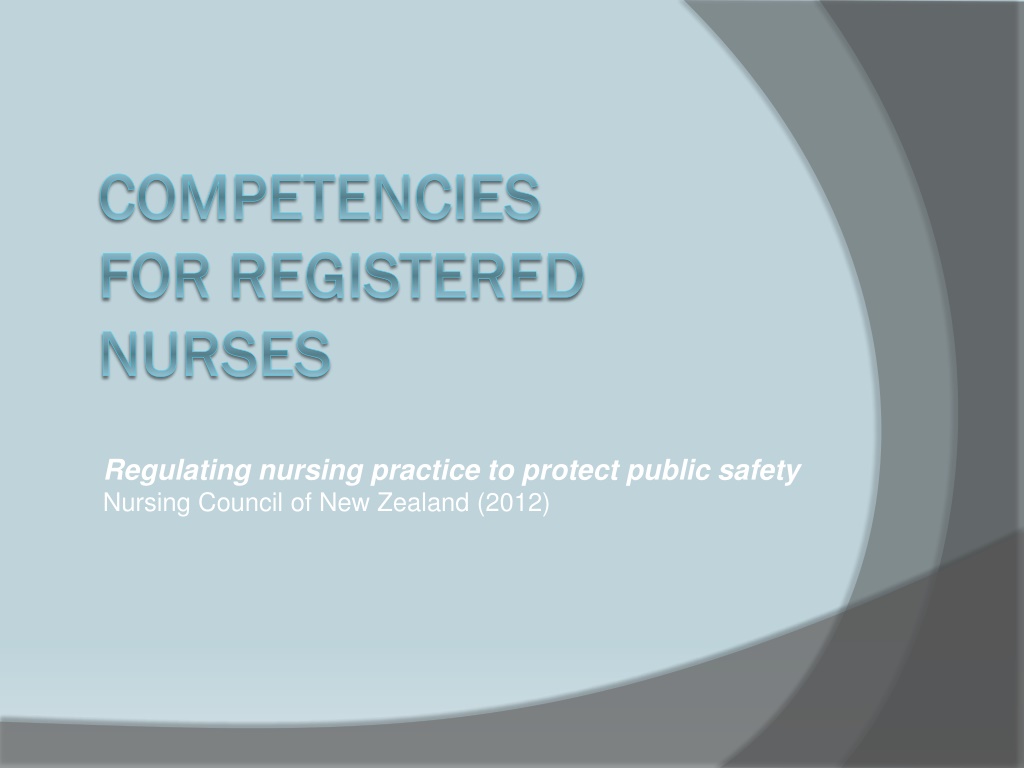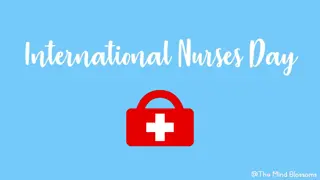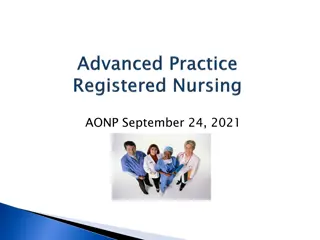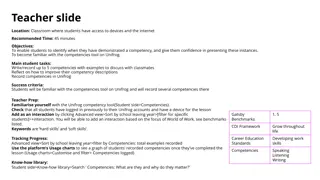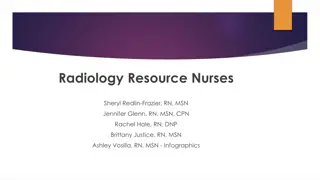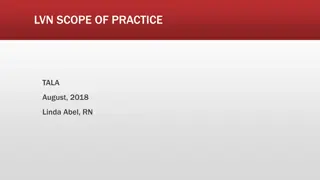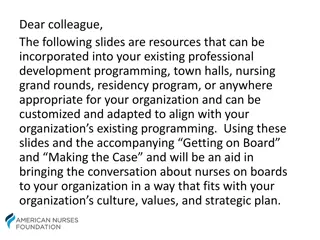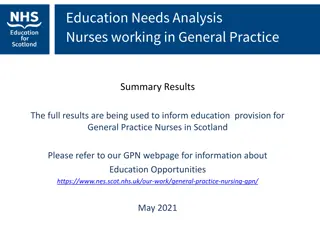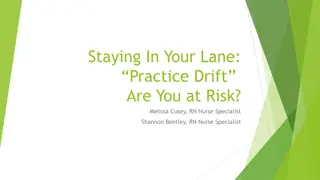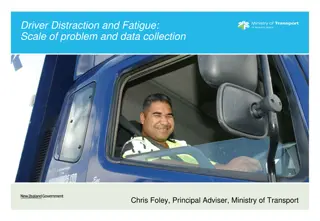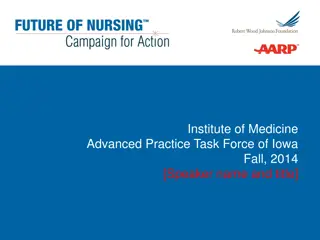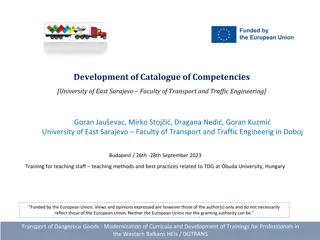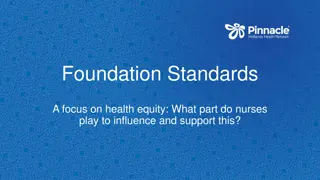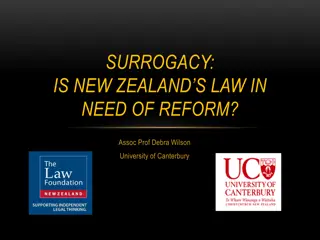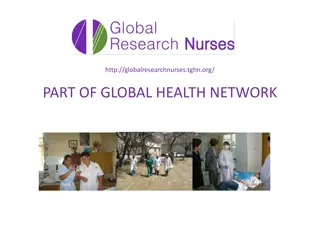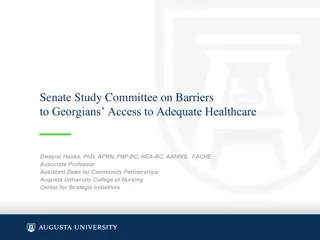Competencies and Scope of Practice for Registered Nurses in New Zealand
The Competencies and Scope of Practice for Registered Nurses in New Zealand focus on regulating nursing practice to ensure public safety. Registered Nurses are expected to utilize nursing knowledge and judgment to assess health needs, provide care, and support individuals in managing their health. They are also responsible for comprehensive assessments, developing care plans, and providing interventions in collaboration with healthcare professionals. Additionally, Registered Nurses may practice in various clinical contexts, manage, teach, evaluate, and research nursing practice while adhering to educational and legislative standards.
Download Presentation

Please find below an Image/Link to download the presentation.
The content on the website is provided AS IS for your information and personal use only. It may not be sold, licensed, or shared on other websites without obtaining consent from the author. Download presentation by click this link. If you encounter any issues during the download, it is possible that the publisher has removed the file from their server.
E N D
Presentation Transcript
COMPETENCIES COMPETENCIES FOR REGISTERED FOR REGISTERED NURSES NURSES Regulating nursing practice to protect public safety Nursing Council of New Zealand (2012)
Registered Nurse Scope of Practice: Utilise nursing knowledge and complex nursing judgment to assess health needs and provide care, and to advise and support people to manage their health. Practise independently and in collaboration with other health professionals, to perform general nursing functions and delegate to and direct enrolled nurses, healthcare assistants and others.
Registered Nurse Scope of Practice: Provide comprehensive assessments to develop, implement, and evaluate an integrated plan of health care, and provide interventions that require substantial scientific and professional knowledge, skills and clinical decision making. This occurs in a range of settings in partnership with individuals, families, whanau and communities.
Registered Nurse Scope of Practice: RNs may practise in a variety of clinical contexts depending on their educational preparation and practice experience. RNs may also use this expertise to manage, teach, evaluate and research nursing practice RNs are accountable for ensuring all health services they provide are consistent with their education and assessed competence, meet legislative requirements and are supported by appropriate standards.
Definition of Competence The combination of skills, knowledge, attitudes, values and abilities that underpin effective performance as a nurse. (NCNZ, 2007)
Domains of Competence: There are four domains of competence for the registered nurse scope of practice. Evidence of safety to practise as a registered nurse is demonstrated when the applicant meets the competencies within each domains. There are: Four domains Competencies within the domains Indicators within the competencies
Domains of Competence Professional responsibility Management of nursing care Interpersonal relationships Inter-professional healthcare and quality improvement
Domain one: Professional responsibility This domain contains competencies that relate to professional, legal and ethical responsibilities and cultural safety. These include being able to demonstrate knowledge and judgement and being accountable for own actions and decisions, while promoting an environment that maximises health consumer safety, independence, quality of life and health.
Competencies 1.1 Accepts responsibility for ensuring that his/her nursing practice and conduct meet the standards of the professional, ethical and relevant legislated requirements 1.2 Demonstrates the ability to apply the principles of the Treaty of Waitangi/Te Tiriti o Waitangi to nursing practice 1.3 Demonstrates accountability for directing, monitoring and evaluating nursing care that is provided by nurses assistants, enrolled nurses and others 1.4 Promotes an environment that enables client safety, independence, quality of life and health 1.5 Practices nursing in a manner that the client determines as being culturally safe
Competencies 1.1 Accepts responsibility for ensuring that his/her nursing practice and conduct meet the standards of the professional, ethical and relevant legislated requirements Indicator: Practises nursing in accord with relevant legislation/codes/policies and upholds health consumers rights derived from that legislation. Indicator: Accepts responsibility for actions and decision making within scope of practice. Indicator: Identifies breaches of law that occur in practice and reports them to the appropriate person(s). Indicator: Demonstrates knowledge of, and accesses, policies and procedural guidelines that have implications for practice. Indicator: Uses professional standards of practice.
Domain two: Management of nursing care This domain contains competencies related to assessment and managing health consumer care, which is responsive to the consumers needs, and which is supported by nursing knowledge and evidence based research.
Competencies 2.1 Provides planned nursing care to achieve identified outcomes. 2.2 Undertakes a comprehensive and accurate nursing assessment of health consumers in a variety of settings. 2.3 Ensures documentation is accurate and maintains confidentiality of information. 2.4 Ensures the health consumer has adequate explanation of the effects, consequences and alternatives of proposed treatment options. Refer to NCNZ document for indicators
Competencies 2.5 Acts appropriately to protect oneself and others when faced with unexpected health consumer responses, confrontation, personal threat or other crisis situations. 2.6 Evaluates health consumer s progress toward expected outcomes in partnership with health consumers. 2.7 Provides health education appropriate to the needs of the health consumer within a nursing framework. 2.8 Reflects upon, and evaluates with peers and experienced nurses, the effectiveness of nursing care. Refer to NCNZ document for indicators
Domain three: Interpersonal relationships This domain contains competencies related to interpersonal and therapeutic communication with health consumers, other nursing staff and interprofessional communication and documentation.
Competencies 3.1 Establishes, maintains and concludes therapeutic interpersonal relationships with health consumers. 3.2 Practises nursing in a negotiated partnership with the health consumer where and when possible. 3.3 Communicates effectively with health consumers and members of the health care team. Refer to NCNZ document for indicators
Domain four: Interprofessional health care & quality Improvement This domain contains competencies to demonstrate that, as a member of the health care team, the nurse evaluates the effectiveness of care and promotes a nursing perspective within the interprofessional activities of the team.
Competencies 4.1 Collaborates and participates with colleagues and members of the health care team to facilitate and coordinate care. 4.2 Recognises and values the roles and skills of all members of the health care team in the delivery of care. 4.3 Participates in quality improvement activities to monitor and improve standards of nursing. Refer to NCNZ document for indicators
Evidence of Professional Development Activities which meet individual needs in the context of individual practice Activities may be within work environment or within an educational setting Professional development must be relevant to your practice as a nurse Professional development may be taken as whole days or hours May be a variety of learning activities such as degree papers, short courses, seminars, conferences, in-service education or journal reading
As a registered nurse Continuing Competence Requirements Individual nurses expected to keep portfolios with evidence of continuing competence (all evidence to be verified) Evidence of practice (minimum 60 days in the last three years) Evidence of professional development (minimum 60 hours in the last three years) Evidence of assessment of competence
Evidence of assessment of competence Two of the following methods of assessments of practice against nursing council competencies: Self assessment Senior nurse assessment or performance appraisal Peer review or evidence of involvement in peer review activities A peer review activity is an activity that occurs with one or more peers who review aspects of a nurses practice e.g. review of care plans, observation of practice or discussion about practice issues. It will include feedback about the nurse s performance
Audit of Continuing competence requirements Nursing Council can review competence at any time Council will randomly select 5% of nurses a year and audit An audit will look at the evidence within a portfolio (Evidence of practice hours, professional development hours and assessment of competence
Glossary of Terms Appropriate Matching the circumstances of a situation or meeting the needs of the individual or group. Assessment A systematic procedure for collecting qualitative and quantitative data to describe progress and ascertain deviations from expected outcomes and achievements. Attributes Characteristics which underpin competent performance. Benchmark Essential standard. Competence The combination of skills, knowledge, attitudes, values and abilities that underpin effective performance as a nurse. Competent The person has competence across all domains of competencies applicable to the nurse, at a standard that is judged to appropriate for the level of nurse being assessed. Competency A defined area of skilled performance. Context The setting/environment where competence can be demonstrated or applied. Cultural Safety The effective nursing practice of a person or family/whanau from another culture, and is determined by that person or family. Culture includes, but is not restricted to, age or generation, gender, sexual orientation, occupation and socio-economic status, ethnic origin or migrant experience, religious or spiritual belief, and disability.
Domain An organised cluster of competencies in nursing practice. Effective Having the intended outcome. Enrolled nurse A nurse registered under the enrolled nurse scope of practice. Expanded practice Expanding the boundaries of nursing practice occurs as a professional strategy in response to a changing health care need with increased range of autonomy, accountability and responsibility. There is a formal pathway to role expansion that entails further education and credentialing. Health Consumer An individual who receives nursing care or services. This term represents patient, client, resident or disability consumer. This term is used in the Health Practitioners Competence Assurance Act (2003) Indicator Key generic examples of competent performance. They are neither comprehensive nor exhaustive. They assist the assessor when using their professional judgement in assessing nursing practice. They further assist curriculum development. Legislated Those requirements laid down by New Zealand Acts and regulations. Nurse A registered nurse, nurse practitioner or enrolled nurse.
Nursing Council of New Zealand The responsible authority for nurses in New Zealand with legislated functions. The Nursing Council of New Zealand governs the practice of nurses by setting and monitoring standards of registration which ensures safe and competent care for the public of New Zealand. As the statutory authority, the Council is committed to enhancing professional excellence in nursing. Nursing Practice Using nursing knowledge in a direct relationship with clients or working in nursing management, nursing administration, nursing education, nursing research, nursing professional advice or nursing policy development roles, which impact on public safety. Performance criteria Descriptive statements which can be assessed and which reflect the intent of a competency in terms of performance, behaviour and circumstance. Registered nurse A nurse registered under the registered nurse scope of practice. Reliability The extent to which a tool will function consistently in the same way with repeated use. Treaty of Waitangi The founding document for Aotearoa/New Zealand signed in 1840 by the Maori people and the British Crown. Validity The extent to which a measurement tool measures that which it purports to measure actions under the Health Practitioners Competence Assurance Act 2003.
QUIZ Use this powerpoint and the NCNZ competencies for registered nurses document to help you complete the quiz on eMIT.
